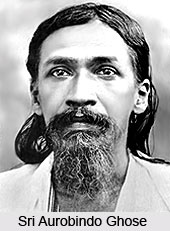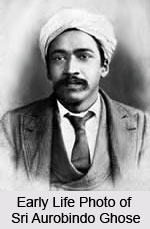 Aurobindo Ghose was a great man of his generation, who was at par with thinkers and active workers like Bal Gangadhar Tilak. C.R. Das had portrayed him as a poet of patriotism, prophet of nationalism and lover of humanity. All his life the central theme of all his teachings and philosophies had been the evolution of life to life divine. Aurobindo Ghose was against Western Culture and felt that it was materialistic and soul killing. His love for India and her past was intense. He was quiet inspired and influenced by Bankimchandra Chatterjee`s writings. His active participation in politics was only for a brief period of five years i.e. from 1905-1910.
Aurobindo Ghose was a great man of his generation, who was at par with thinkers and active workers like Bal Gangadhar Tilak. C.R. Das had portrayed him as a poet of patriotism, prophet of nationalism and lover of humanity. All his life the central theme of all his teachings and philosophies had been the evolution of life to life divine. Aurobindo Ghose was against Western Culture and felt that it was materialistic and soul killing. His love for India and her past was intense. He was quiet inspired and influenced by Bankimchandra Chatterjee`s writings. His active participation in politics was only for a brief period of five years i.e. from 1905-1910.
Sri Aurobindo Ghose was born to a respected family of Konnagar in West Bengal. He was born to Sri Krishnadhan Ghose and Swamalata, at Kolkata, in Bengal on 15th of August in 1871. Raj Narayan Bose a notable figure of Indian Nationalism had been the maternal grandfather to him. Importantly Aurobindo Ghose owes all his spiritual nature and excellent literary capacity to his mother. Sri Aurobindo Ghose`s father was very inclined that his children should be educated in the English medium and their education should be free of any Indian influences and as a result he sent his children to the Loreto Convent in Darjeeling.
As a boy, Aurobindo received his early education in a public school in England. The headmaster of the school had soon noticed that Aurobindo was more superior to others with regard to intellectual capacity. From school Aurobindo reached King`s College, Cambridge, where he proved himself as a scholarly student of European classics. He successfully passed the Indian Civil Service Examination in 1890 but as he failed to stand the required test in horsemanship, he was prevented from entering the Covenantal Service of the Indian Government. As Ghose returned to India, he was soon made the Vice-principal of the State college in Baroda. The Maharaja of Baroda held him in great respect.
Aurobindo`s scholarship soon caught everyone`s attention. The educated classes in Baroda State loved him and he was exceedingly popular among the common mass. Sri K.M. Munshi, one of his students, admired and loved Aurobindo. To the younger generation, Aurobindo became an absolute god and they called him as "Aru Da", meaning "elder brother Aurobindo". Aurobindo later tied the nuptial knot with Mrinalini Devi.
Aurobindo was a talented scholar in Greek. He was also well conversant with languages like Latin and French and had also picked up a little German and Italian in order to study Goethe and Dante in the original. He was also very well learned with the teachings of our ancient Vedic scriptures. Sri Aurobindo was a mastermind in both history and poetry, and at the same time also a scholar in English and Latin. He had stayed in England for fourteen long years. In 1893 Aurobindo came back to India and drew a salary of rupees 750 in the Baroda Educational Service. From the year 1893 to 1906 he learnt Sanskrit, Bengali literature, philosophy and political science. Then Ghose joined the Bengal National College with a salary of rupees150 after resigning from the Baroda Educational Service. As a next step he immersed himself completely into the national movement of India. He was a great figure in the nationalist movements of the time.
 The English daily, Bande Mataram, was edited by him. Bande Mataram consisted of daring and sharp editorials written by Ghose. He then started the English weekly Dharma and spread his message: "Our ideal of Swaraj is absolute autonomy, absolute self-rule, free from foreign control" through it. In those days, Aurobindo encouraged Indians to boycott everything that was British and he also instilled in the minds of people the spirit of passive resistance.
The English daily, Bande Mataram, was edited by him. Bande Mataram consisted of daring and sharp editorials written by Ghose. He then started the English weekly Dharma and spread his message: "Our ideal of Swaraj is absolute autonomy, absolute self-rule, free from foreign control" through it. In those days, Aurobindo encouraged Indians to boycott everything that was British and he also instilled in the minds of people the spirit of passive resistance.
Aurobindo Ghose had also been instrumental in bringing about national awakening among the Indians. He was the leader of the revolutionary movement and played a great part in the country`s national struggle from 1908. He had fearlessly led the national struggle during the days of Partition of Bengal 1905. It was the famous Alipore Bomb Case that had influenced Aurobindo`s life greatly. For a period of one year Aurobindo was kept in a solitary confinement in the Alipore Central Jail. It was in the Jail where Aurobindo had realised his divine mission. Aurobindo bore the rigors of imprisonment, the bad food, the inadequate clothes, the lack of light and free air, the strain of boredom and the creeping solitariness of the gloomy cell. It was during this time that Sri Ghose equipped himself with the teachings of the Bhagavad Gita. Chittaranjan Das fought for Aurobindo and it was his effort that helped Aurobindo to get acquitted.
Sri Aurobindo moved from Kolkata to Chandannagar and then reached Puducherry on 4th April, 1910. At Puducherry, he stayed at a friend`s place with four or five companions. Gradually the number of members increased. An Ashram grew up around him. Now there are a lot of inmates in the Ashram accommodated in more than a hundred houses. Dairy farming, vegetable gardening, laundry, baking activities are all part of the ashram activities which are carried out by the ashramites as a part of their sadhana. The female inmates of the Aurobindo ashram work in the printing press of the ashram.
Mira, a French lady, wife of Paul Richard, was inspired with the ideologies of Aurobindo Ghose and as a result she had become a part of the ashram in 1920. She was known as the Mother and took care of all the activities of the ashram. Every morning she reached out to the eager devotes from the balcony of her room. She took special care of all the activities related to the management of the ashram. Arya, a spiritual journal was initiated by Mother and Paul Richard comprising all the great achievements of Aurobindo serially. The Arya had stopped its publication after six and a half years.
Once Rabindranath Tagore visited the Aurobindo ashram and said, "You have the word and we are waiting to accept it from you. India will speak through your voice to the world".
Sri Aurobindo`s philosophy has a lot of practicality associated with it. It can be said that his philosophy revolves around logic and rationality. Aurobindo not just aimed at liberation of the individual mind but his core philosophy was "to work out the will of the Divine in the world, to effect a spiritual transformation and to bring down the divine nature and a divine life into the mental, vital and physical nature and life of humanity".
Aurobindo`s Life Divine is, and will always remain, a force guiding the thoughts of men all over the world. Some of Aurobindo`s publications are Essays on Gita, Ideal and Progress, Isa Upanishad, The Superman, Evolution, Heraclitus, The Ideal of the Karmayogin, The Brain of India, the Renaissance in India, Bases of Yoga, Kalidasa, Vikramorvasi or The Hero and the Nymph, Poems, The Riddle of This World and a lot more.
Aurobindo Ghose passed away on 5th of December, 1950 at Puducherry. During his lifetime he had remained a poet, a politician and a philosopher. His intellectual spirit had nurtured India to a large extent. India will never be able erase from memory the services rendered by Aurobindo and also the richness of his philosophy. The world will also remember with reverence his contributions in the realms of philosophy and religion.






